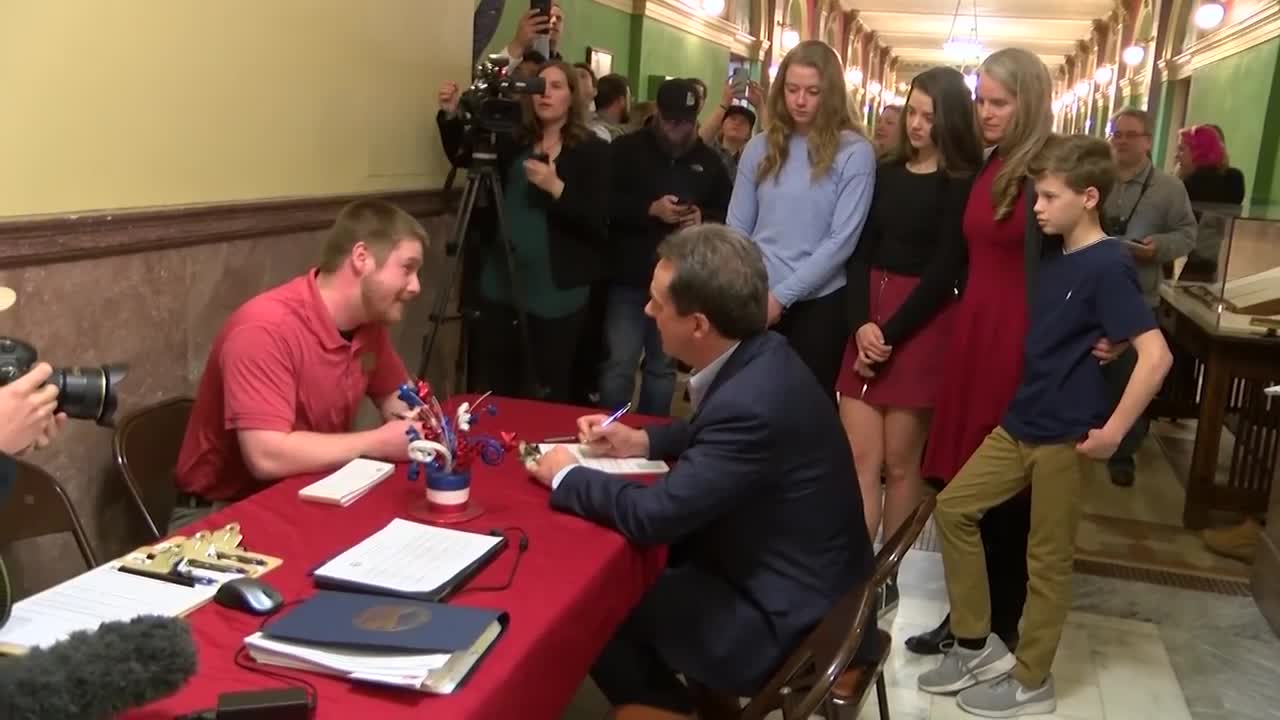Ending days of speculation, Democratic Gov. Steve Bullock entered Montana’s U.S. Senate race Monday, immediately vaulting the contest into the top tier of Senate battles nationwide.
Bullock, 53, who spent seven months running for president last year and had repeatedly rejected the idea of challenging Republican incumbent Steve Daines, announced his change of plans with a 6 a.m. press and video release.
Six hours later, the governor walked from his second-floor Capitol office down the hallway to the secretary of state’s office, where he officially filed as a candidate, with his wife, Lisa, and their three children by his side.
Talking to reporters afterwards, Bullock said he could help bring a bipartisan, common-sense approach to a Congress that seems unable to address the nation’s big problems.
“You look at some of the big challenges that we’re facing, and they won’t even tackle them,” he said of Congress. “I think what I can bring is the experience of being governor of a state and actually having to listen to and work with people all across this state and also work with people with whom we do not see the world eye-to-eye.”
Bullock and his wife also said the family played a crucial role in changing his, and their mind, about entering the Senate race.
“We felt as a family that there is something that is bigger and greater than the five of us need right now,” Lisa Bullock said. “We met as a family and asked the kids for their input, which we took that to heart, and we just made a decision as a family that at this time, it’s better to jump in and run and see what we can contribute not only for our state, but for our country.”
Bullock’s entry into the race prompted almost immediate reverberations from Montana to Washington, D.C., indicative of the attention the contest will now command on a nationwide scale.
The National Republican Senatorial Committee released a statement an hour after Bullock’s announcement, saying he’d “run his administration like a frat house” and had “acquiesced to the far left” during his presidential campaign.
The group blasted Bullock, saying he had supported the impeachment of President Trump and “wants to ban guns.”
From the other end of the political spectrum, the group left-leaning group Progressive Turnout Project announced it would be investing $750,000 into the race on the behalf of Bullock, including field offices in six Montana cities and 26 field staffers.
David Parker, a political science professor at Montana State University, told MTN News that these salvos are likely the first of many in what will be an epic, expensive battle.
“All of the people around the country that put money into races, the big donors, outside organizations -- they’re far more willing to take a look at the Montana race and decide, `You know what, maybe we can put some money into this race, whereas before, it was a lot less likely, because none of the challengers had quite the reach or the popularity that Steve Bullock has,” he said.
Daines and fellow Republicans also have been preparing for many months, for a possible Bullock run.
The state Republican Party filed an ethics complaint against Bullock last Friday, accusing him of improperly using his official social-media accounts to promote his presidential campaign last year.
And Daines, who spoke to MTN News later Monday, said the contest will offer a clear choice, between different visions for the state and the nation.
“This is the most consequential election in my lifetime,” he said. “We’re going to decide the next president of the United States. We’ll decide who leads the U.S. Senate and thereby the future of the U.S. Supreme Court.
“This is a big deal for Montana, it’s a big deal for our country. And I’ve always been consistent fighting for more jobs and less government and defending our Montana way of life."
Republicans hold a 53-47 majority in the U.S. Senate. With Bullock in the race, the Montana Senate contest is one of at least five Republican-held seats that Democrats hope they could flip in 2020 and possibly win the majority.
Daines had been considered a clear favorite for re-election, facing off against a field of largely unknown and underfunded candidates. Now, the race becomes one likely to cost tens of millions of dollars, headed by two of the best-known political figures in the state.
Cora Neumann, one of four other Democrats who’d already filed in the Senate race, announced Monday morning that she will drop out and support Bullock, and another Democrat, Helena Mayor Wilmot Collins, later said he would suspend his campaign.
Yet Democrat John Mues, a U.S. Navy veteran and engineer for an energy firm, told MTN News he plans to stay in the race.
“I just think there are a lot of issues that we can talk about, and it will strengthen everybody,” Mues said.
Bullock’s kickoff video listed off many of the accomplishments that he highlighted during his aborted presidential run: The passage of Medicaid expansion to cover 90,000 low-income Montanans, freezing college tuition in the state, low unemployment and restrictions on campaign “dark money.”
Bullock also declined Monday to criticize Daines directly, saying the time would come soon to start emphasizing the differences between their records and ideals for the state and the country.




